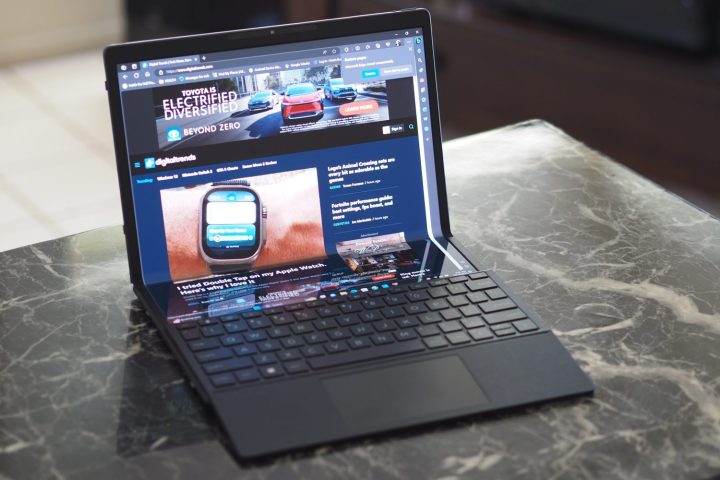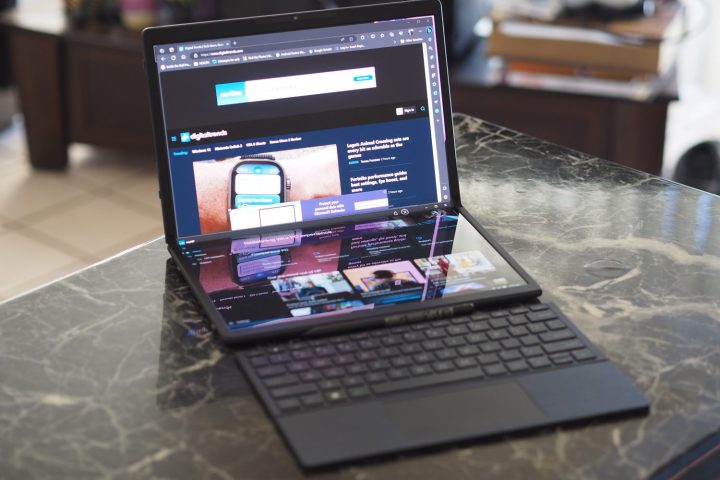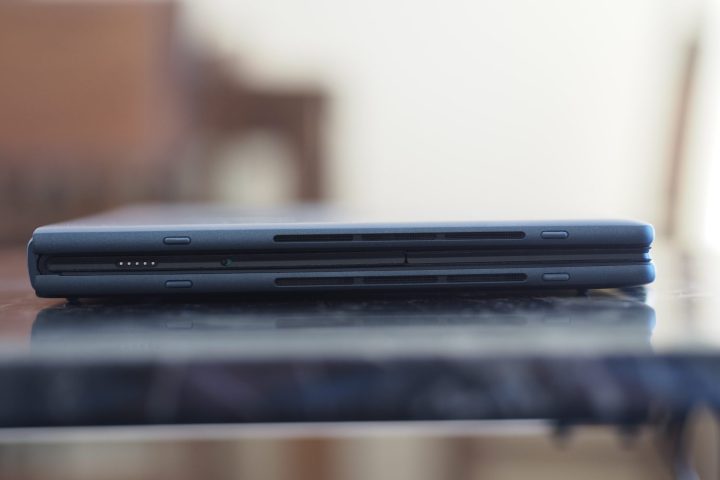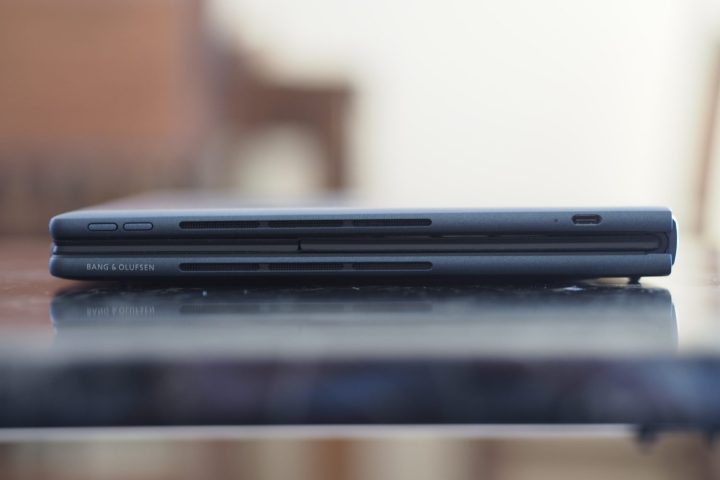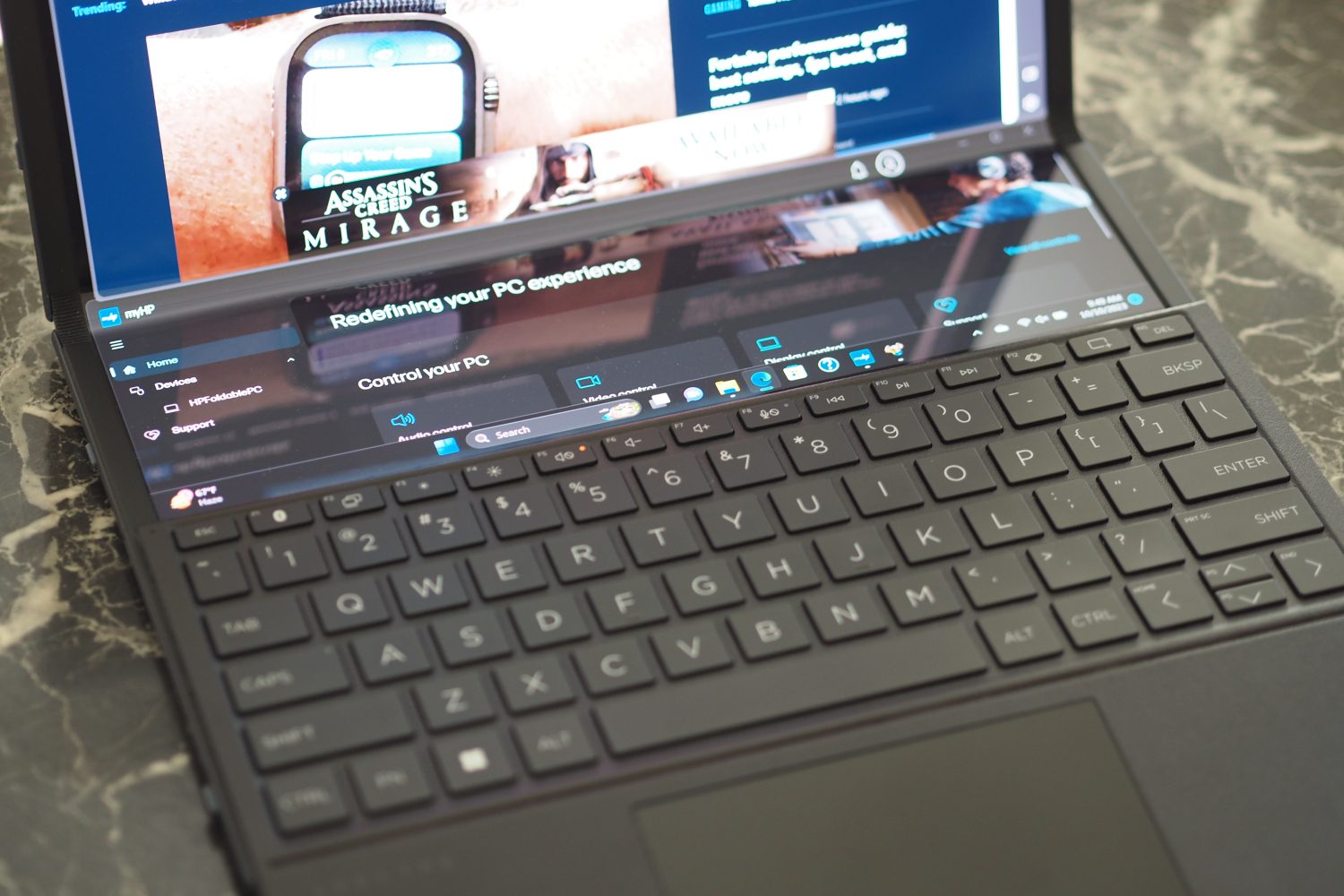
HP Spectre Foldable PC
MSRP $5,000.00
“You’ll love using the highly innovative HP Spectre Foldable PC – if you can afford it.”
Pros
- Exquisite design
- Solid build quality
- Excellent foldable OLED display
- Great keyboard
- Plenty of usable formats
- Above-average battery life
Cons
- Extremely expensive
- Tablet mode is overly large
- Clamshell display resolution is relatively low
PCs with multiple screens are a thing.
Of the number of options out there, they all more of less consist of a foldable screen, a detachable keyboard, and a few different “modes” to use it in. There’s even the Lenovo Yoga Book 9i, which used two separate OLED panels to accomplish that same goal.
The Spectre Foldable PC is HP’s first attempt at this type of product, and it takes more inspiration from the Asus Zenbook 17 Fold than the Yoga Book. It uses a 17-inch tablet that folds in the middle, just like the Asus. HP calls it a 3-in-1, with tablet, clamshell, and desktop modes, and that’s more than just marketing. It’s incredibly easy to switch from one mode to another, and each one is surprisingly usable. I liked the Spectre Foldable PC quite a bit and consider it one of the most innovative laptops, but I’m afraid the hefty investment of $5,000 will scare most people away.
Specs and configurations
| HP Spectre Foldable PC | |
| Dimensions | 10.91 inches x 14.81 inches x 0.33 inches (unfolded) 10.1 inches x 7.53 inches x 0.84 inches (folded) |
| Weight | 3.58 pounds (with keyboard) 2.99 pounds (without keyboard) |
| Processor | Intel Core i7-1250U |
| Graphics | Intel Iris Xe |
| RAM | 16GB |
| Display | 17.0-inch 3:4 2.5K (2,560 x 1,920) OLED |
| Storage | 1TB SSD |
| Touch | Yes |
| Ports | 2 x USB-C with Thunderbolt 4 |
| Wireless | Wi-Fi 6E and Bluetooth 5.3 |
| Webcam | 5MP with infrared camera for Windows 11 facial recognition |
| Operating system | Windows 11 |
| Battery | 94.3 watt-hours |
| Price |
$5,000 |
There’s just one configuration of the Spectre Foldable PC, which comes in at $5,000 for a Core i7-1250H CPU, 16GB of RAM, a 1TB SSD, and a 17.0-inch 2.5K OLED display that folds in the middle. As already mentioned, it’s an incredibly expensive machine that will appeal to a very select group of users. The Asus Zenbook Fold 17 is also expensive at $3,500, but that’s a more accessible price.
Innovation meets attention to detail
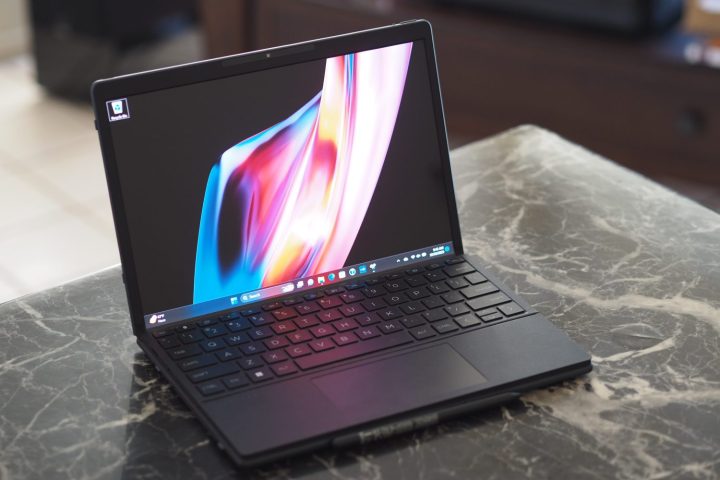
I’d say that the Spectre Foldable PC is the most innovative 2-in-1 (or 3-in-1) you can buy, but as mentioned in the introduction, it’s very similar to the Asus Zenbook Fold 17. Both have roughly 17-inch displays when unfolded, making for very large tablets that are more usable in what both companies call “desktop” mode. And they both work very well in that mode with their included external keyboards set in front and their kickstands extended.
Fold the displays, and you can use both as clamshell laptops, with the keyboard placed on the bottom half of the display or with the keyboard sitting in front and the entire display remaining usable. The Spectre Foldable PC has an extra mode, with the keyboard placed on the bottom half of the lower display and the touchpad portion slanting down. That gives you one large and one small display and a more ergonomic palm rest.
You’re unlikely to use the laptop in tablet mode unless you rest it on a surface. Although quite thin, it’s just too large to hold comfortably. One plus: the batteries are split between each half of the display, providing a more balanced feel. But if you set it on a desktop, you’ll have an expansive screen for digital handwriting and drawing. Clamshell mode with the keyboard on top felt completely natural, and desktop mode is excellent if you have the space to spread everything out. Overall, I found usability to be excellent.
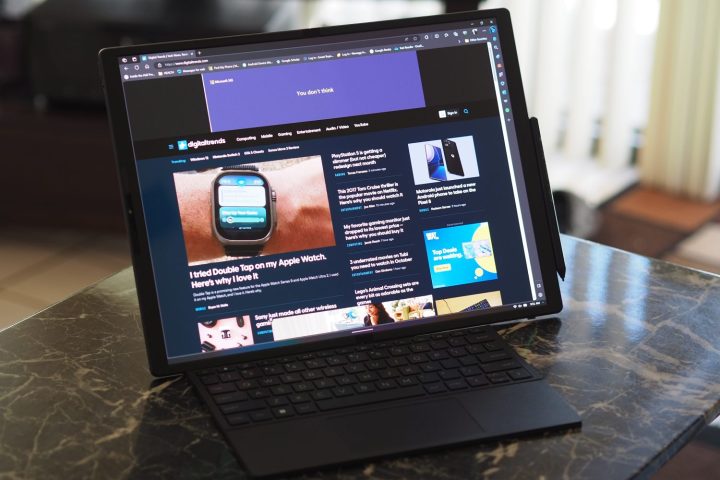
Compared to the Asus, the Spectre Foldable PC is arguably a more elegant solution. To begin with, it’s thinner at just 0.33 inches versus 0.51 inches and slightly lighter at 2.99 pounds versus 3.3 pounds. This is because HP’s kickstand is a simpler design that integrates into the back of the tablet, while the Asus version is an extra layer on the back that folds out. That makes the Spectre Foldable PC thinner and lighter when folded as well, with and without the keyboard enclosed. The kickstand is rubberized, and so it has some grip that keeps the tablet in place at up to a 120-degree angle.
The keyboard charges when it’s attached magnetically to the lower half of the display, keeping it topped off during use. The Asus keyboard is charged separately, which is a lot less convenient. The same is true for the HP active pen included in the box, which connects magnetically to the side of the keyboard and tablet and charges while connected to the latter.
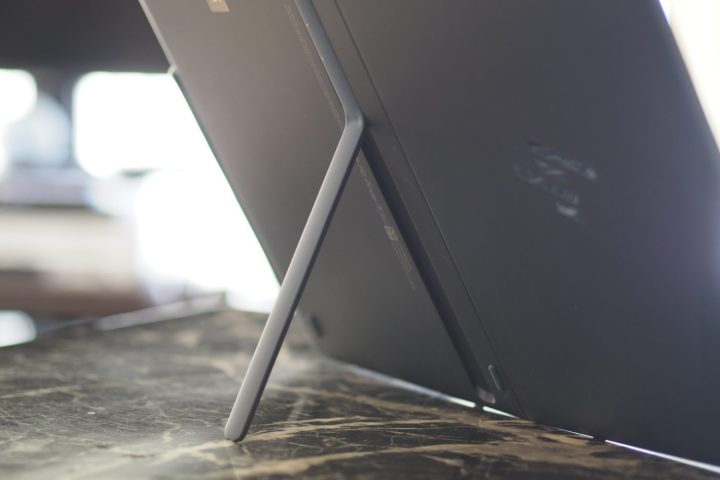
HP paid a lot of attention to the details, and it shows. If you’re concerned about sustainability, HP also covered that with various components that use recycled materials.
The Spectre Foldable PC is made of a 90% recycled magnesium alloy and felt rigid across all its various surfaces. It exudes quality, which it should for $5,000. I have some concerns with the durability of the display fold, but that’s true of all foldable displays. The mechanics are well-designed and certainly appear robust — it’s rated up to 25,000 folds — but only time will tell if it avoids issues. The display is likely to be folded less often than foldable smartphones, which should add some long-term reliability.
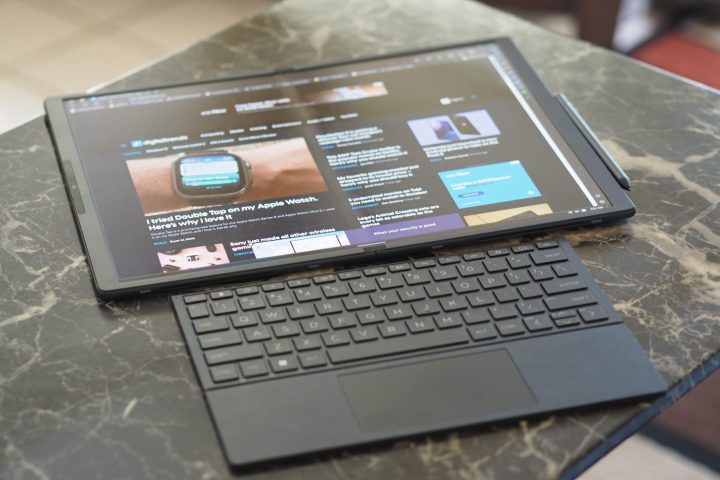
The keyboard is excellent, with large keycaps and light and snappy switches. It’s one of the better external keyboards I’ve used. While it’s narrower than the keyboards on the typical 13-inch laptop, it didn’t feel cramped to me. That contrasts with the equally narrow keyboard on the Microsoft Surface Laptop Go 3, which felt much less comfortable.
It must come down to the height of the keycaps and how the keyboard is arranged because otherwise, I can’t explain the difference. I was immediately typing on HP’s keyboard at full speed, while I struggled to get used to Microsoft’s. The touchpad is large enough with a precise surface and quiet, confident clicks.
Connectivity is limited to just two Thunderbolt 4 ports, one of which is used for charging. They’re located on opposite sides of the tablet, making charging convenient in all modes. There’s no audio port, which is disappointing, particularly given all the space to build one in. Wireless connectivity is up to date.
Finally, the webcam is a 5MP version that provides excellent, detailed image quality. There’s a physical privacy switch that turns it on and off. The Spectre Foldable PC makes for an excellent videoconferencing solution in desktop mode. There’s also an infrared camera for logging in via Windows 11 Hello facial recognition, which always works best with tablets.
HP also included user presence-sensing technology with a separate AI chip that can lock and put the laptop to sleep when the user steps away and wake it back up when the user returns. The screen can be automatically dimmed when the user looks away, and a privacy alert feature notifies when someone else is looking at the display. The technology also enables gesture controls that allow for pausing, resuming, and scrolling through videos.
Good enough performance, but just barely

The Spectre Foldable PC uses a 12th-generation low-power Intel CPU, the Core i7-1250U. Normally, I’d penalize a laptop, particularly one that’s so expensive, for using a last-gen processor. However, HP wanted a 9-watt chip for maximum efficiency, and Intel hasn’t released a 9-watt 13th-gen version. The Core i7-1250U has 10 cores (two Performance and eight Efficient) and 12 threads, and on paper should provide competent productivity performance.
We don’t have many similar machines to compare against, but performance doesn’t depend on the form factor. In our comparison group, which includes the Asus Zenbook Fold 17 and Lenovo Yoga Book 9i, the Spectre Foldable PC was relatively fast among other machines using the same CPU. Naturally, it fell behind laptops running faster processors.
Ultimately, the performance was good enough for the laptop’s intended uses. That includes typical productivity tasks like web browsing, email, Office applications, inking on the tablet, etc. But things will be slower in more demanding tasks like creativity and apps that use multiple cores.
| Geekbench 5 (single / multi) |
Handbrake (seconds) |
Cinebench R23 (single / multi) |
PCMark 10 Complete |
|
| HP Spectre Foldable PC (Core i5-1250U) |
Bal: 1,684 / 4,569 Perf: 1,684 / 6025 |
Bal: 269 Perf: 179 |
Bal: 1,380 / 3,911 Perf: 1,507 / 4,785 |
4,556 |
| Asus Zenbook Fold 17 (Core i7-1250) |
Bal: 1,584 / 5,821 Perf: N/A |
Bal: 219 Perf: N/A |
Bal: 1,172 / 3,319 Perf: N/A |
N/A |
| Lenovo Yoga Book 9i (Core i7-1355U) |
Bal: 1,797 / 6,926 Perf: 1,804 / 7,815 |
Bal: 181 Perf: 118 |
Bal: 1,681 / 6,303 Perf: 1,758 / 7,576 |
5,514 |
| Microsoft Surface Laptop Go 3 (Core i5-1235U) |
Bal: 1,179 / 5,652 Perf: 1,524 / 6,226 |
Bal: 194 Perf: 214 |
Bal: 1,118 / 5,170 Perf: 1,534 / 4894 |
4,227 |
| Dell XPS 13 9315 (Core i5-1230U) |
Bal: 1,393 / 4,459 Perf: 1,477 / 5,350 |
Bal: 333 Perf: 192 |
Bal: 1,379 / 3,457 Perf: N/A |
4,023 |
| Apple MacBook Air M1 (M1) |
Bal: 1.727 / 7,585 Perf: N/A |
Bal: 156 Perf: N/A |
Bal: 1,479 / 6,680 Perf: N/A |
N/A |
Battery life was surprisingly good. In clamshell mode with the keyboard attached and drawing some power, the Spectre Foldable PC lasted roughly 8.5 hours in our web-browsing test and about 12 hours in the PCMark 10 Applications battery benchmark. I expected battery life to be less in tablet mode, given that half the display is turned off when running as a traditional clamshell. With the display folded and the entire surface in use, I saw around nine hours in web browsing and 11.25 hours in the PCMark 10 test. So, the results were mixed, and I have no good theories as to why. For some reason, the laptop wouldn’t complete our video-looping test, with the video randomly stopping and requiring a manual restart.
These results place the battery life above average among all laptops. You might get close to a full day’s work, depending on your workflow. That’s a bit better than the Zenbook Fold 17, which lasted around eight hours of web browsing.
An almost-superior OLED display
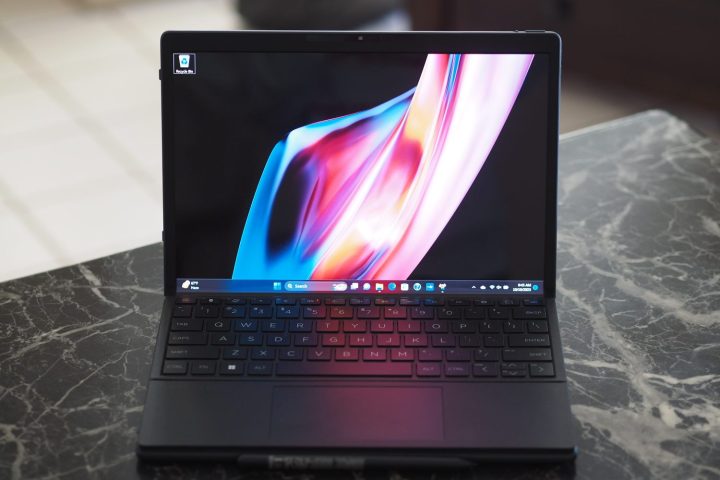
The Spectre Foldable PC has a 4:3 2.5K OLED display that’s 17.0 inches diagonal when unfolded in tablet mode. Subjectively, it’s incredibly gorgeous, with bright colors and inky blacks, and the fold down the middle is invisible face-on when it’s fully extended. The biggest problem with the display is that when you’re working in 3:2 clamshell mode, the resolution is a relatively low 1,920 x 1,280. That’s not too low at an effective screen size of 12.3 inches, but the text is just a bit pixelated to my eyes. I’m a writer who stares at text all day, so I’m very sensitive to text quality. It likely wouldn’t bother most people.
Another issue is what we also noted with the Asus Zenbook Fold 17. The display seems to include a layer, possibly to accommodate the fold, that creates a “sticky” surface. Inking works fine, but it lacks the smooth feel you get with many other pen-enabled laptops. It’s certainly not as natural an experience as with the Surface Laptop Studio 2 and the haptic-enabled Surface Pen 2. At the same time, I didn’t notice the same level of reflectiveness that we mentioned in our Zenbook Fold 17 review.
When I used my colorimeter to test the display, it performed almost as well as every other OLED display I’ve tested. It was bright at 411 nits and enjoyed an incredibly high contrast ratio at 28,530:1. Colors weren’t as wide as with other OLED panels I’ve tested, though, at 100% of sRGB and DCI-P3, but 91% of AdobeRGB. OLED typically produces closer to 100% of the latter color gamut. That’s better than the typical IPS display, which is around 75% AdobeRGB, but still lower than expected. The colors were incredibly accurate, though, at a DeltaE of 0.56. That’s well under the 1.0 (lower is better) that’s considered excellent, and it’s one of the best scores we’ve seen.
You’ll love using the display for productivity and very light creativity tasks (because of performance), and the 17-inch tablet will make for a great streaming “desktop” media experience. That’s particularly true if you come across any IMAX Enhanced content, which the display supports to provide an expanded aspect ratio and other enhancements. I would have liked a sharper display in clamshell mode, but I could certainly live with this one.
Audio is also a strength. Sound is pumped out of two speakers on each side of the tablet, and there’s a fair amount of volume. with clear mids and highs, plus a touch of bass. It’s not quite MacBook Pro-level audio, but it’s better than any tablet I’ve used and most clamshells as well. You’ll love watching streaming media on the 17-inch desktop, and you won’t feel the need to pull out a pair of Bluetooth headphones.
An excellent device that’s too expensive for most people
I was impressed by the Spectre Foldable PC’s build quality, form factor, and attention to detail. I found it far easier to use than the fussy Lenovo Yoga Book 9i, with fewer parts to carry around and a simpler design that still provided tremendous flexibility and usability. Performance was OK for the typical user, battery life was better than expected, and I could see myself thoroughly enjoying the Spectre Foldable PC as my primary portable solution.
However, I would never buy it. At $5,000, it’s way out of my price range, and I think that will be the case for most people. The Asus Zenbook Fold 17 is closer to the mainstream at $3,500, but even that is too expensive for most buyers. At the same time, plenty of laptops can be equally as expensive or even more costly, such as Apple’s MacBook Pro, so it’s not fair to single HP out. Therefore, I feel confident in recommending the Spectre Foldable PC for people with money to burn or very specific needs that justify such a large investment.
Editors’ Recommendations

